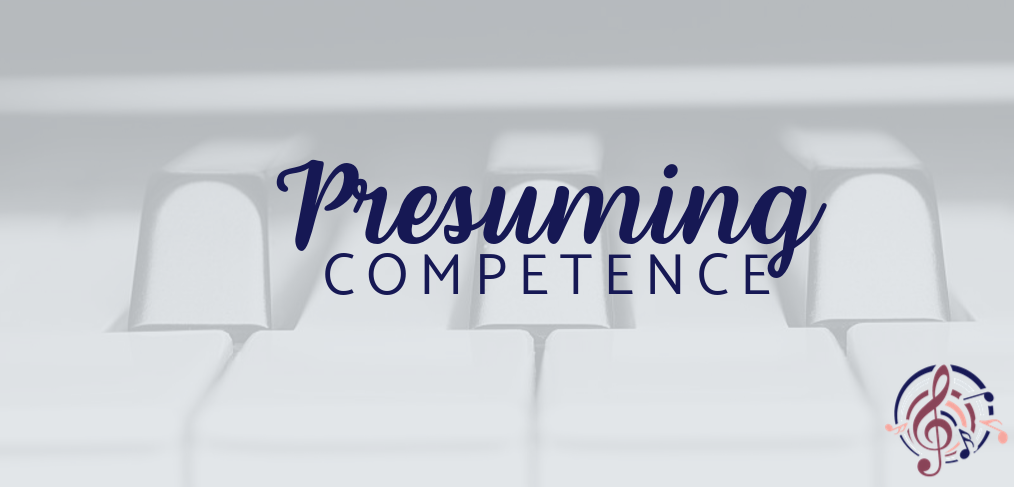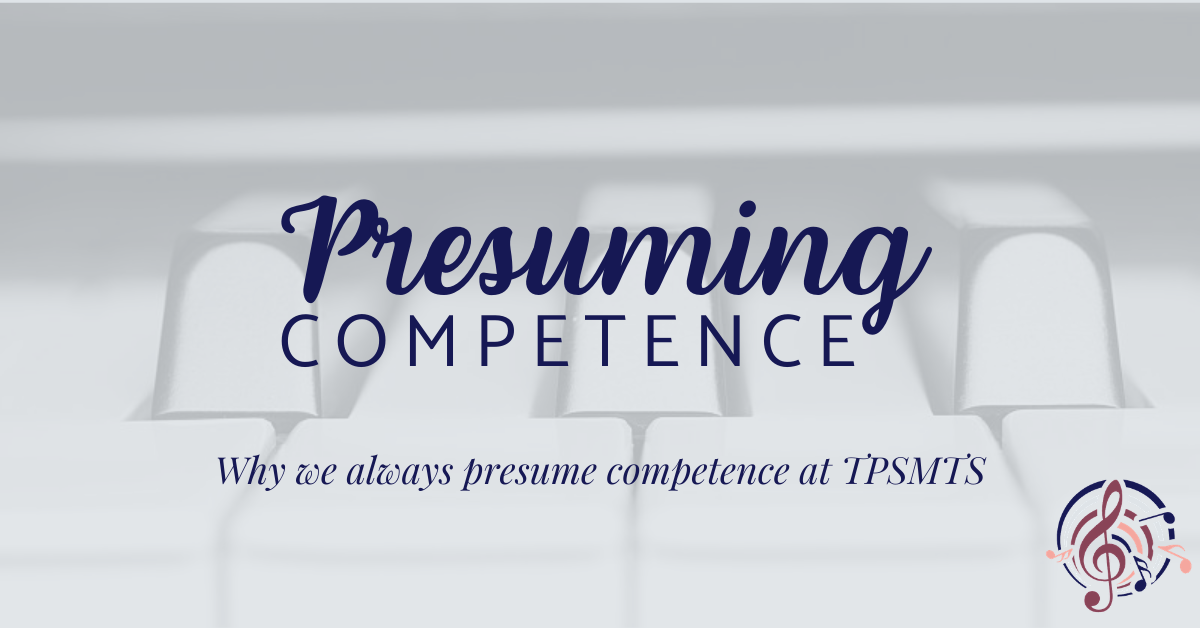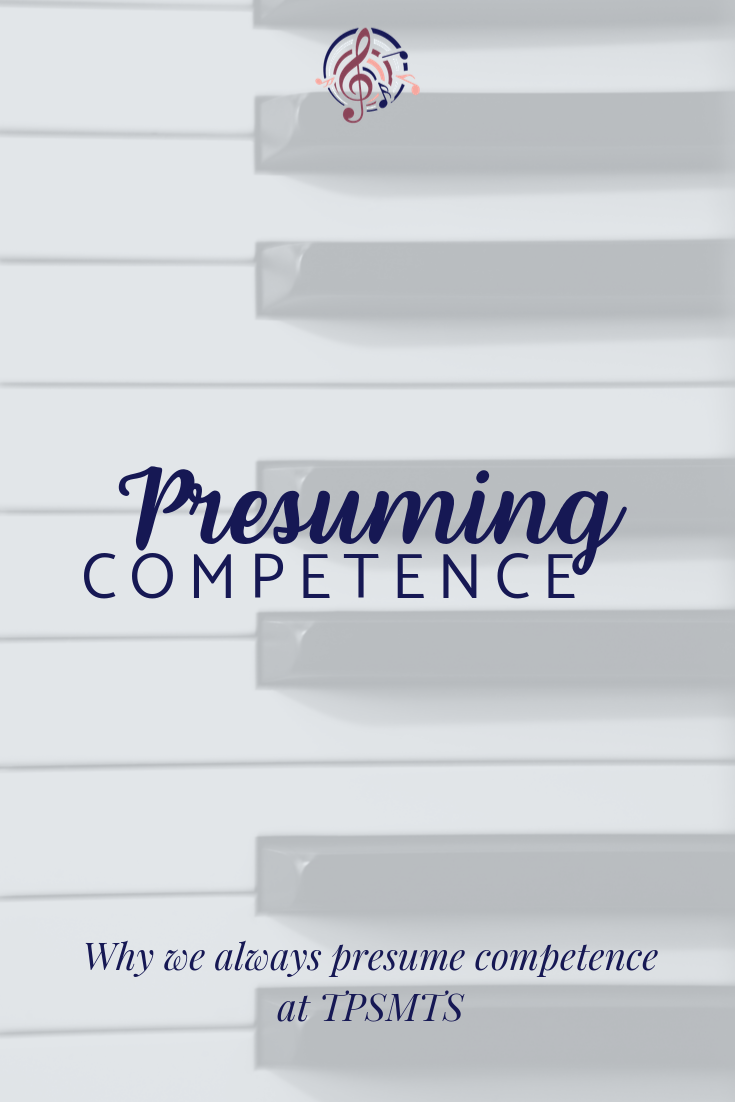
Presuming Competence
Why we always presume competence at TPSMTS
Written by Tamara Leszner-Rovet
Back when I was a Music Therapy intern, I received some of the best advice that has heavily influenced and shaped me as Music Therapist, Music Teacher, mother, and human, defined my career path and private practice, and made TPSMTS what it is today.
This advice was to always presume competence.
This term was originally coined as “the least dangerous assumption” by Anne Donnellan in 1984. To presume competence is “to assume that a child has intellectual ability, provide opportunities to be exposed to learning, assume the child wants to learn and assert him or herself in the world” according to Douglas Biklen (an award winning educator known for his work of promoting quality education for individuals with intellectual disabilities). Biklen says “to not presume competence is to assume that some individuals cannot learn, develop, or participate in the world.”
In other words, one should never underestimate any individual based on how they may initially present or on their abilities.
At TPSMTS, presuming competence is one of our most important values.
We strongly believe that every individual has the ability to understand, learn, and has the right to access high quality Music Therapy and Music Education, whether that be through using Music Therapy to help achieve non-musical goals, or through music lessons to learn how to play an instrument and receive a musical education.
TPSMTS presumes competence in the following ways:
Respecting the chronological age of an individual and treating them as such
I will never forget years ago a parent of a client approaching me, thanking me for speaking to her (then) 16 year old son who was primarily non-verbal like a 16 year old. The parent lamented that most people speak to her son in such a tone that assumes he cannot understand what is being said to him. My answer was plain and simple: your son is 16 years old and should be spoken to as such. This should go for any client — they should be spoken to with respect, assuming they understand what you are saying to them, and in a tone that one would use to speak to another individual of that age that doesn’t have special needs.
Respecting the chronological age of an individual through music
In our team meetings and among my colleagues, we often discuss choosing music to implement in sessions that will not only help achieve therapeutic goals, but that will also respect the chronological age of the client (not developmental). As an example, most 12-year-olds would rather not sing “Head and Shoulders” or “Old MacDonald” so why subject a client to these songs of that age (or older!), because one would assume a children’s song would be better engaging due to familiarity, simplicity, and repetitive lyrics?! True, some individuals may enjoy children’s songs at any age, but our goal as Music Therapists is to expose our clients to different and age-appropriate songs that can still achieve the same goals. This is especially important in social situations for instance, as among their peers a 16-year-old would typically enjoy and discuss with friends the latest pop song playing on the radio or classic rock songs, and not be listening to the children’s music!
This is not to say that children’s music doesn’t always have a purpose in sessions, and can most definitely be used for young children where it is in fact age appropriate music. However, if it is used with older clients it should be functional and relevant to the client’s goals. Examples of this would be singing nursery rhymes and children’s songs with a client with Alzheimer’s to help spark memories and conversation when she worked as an elementary school teacher, or playing a children’s song in a piano method book that teaches important musical concepts.
Expectation that any individual can learn how to play a musical instrument
This may not happen right away, as typically children of all abilities show readiness to learn how to play an instrument anywhere between 4-7 years of age. Regardless, we utilize many different techniques to ensure a child can learn how to play and succeed at playing an instrument.
We tailor learning to the individual’s strengths and needs to ensure a positive and rewarding musical experience. Some examples are teaching songs by rote, using labeled letter names on the keyboard to help facilitate tracking, reading, and playing, hand over hand prompting to help with fine motor weakness and to promote muscle memory, slowly fading to promote independent playing, and many more!
Expectation of proper and appropriate behaviour
Again, respecting the chronological age of a client means that the expectations of how they behave in session should be the same as another individual their age. All too many times, parents have expressed concerns about their child not being able to sit still, follow instructions, etc. Many of these factors have to do not with the client’s diagnosis, but rather their chronological age. No one would expect a 3 year old to sit still for an extended period of time regardless of ability, but this expectation would be appropriate for a client who is older. Sometimes it may not appear that a client is listening or able to follow instructions, but from my experience that doesn’t mean the client doesn’t understand and can’t follow through. If the expectation is placed for proper and appropriate behaviour (which will vary greatly from client to client, and can include techniques such as visual schedules, “first-then” language, token board reward system, rule writing and review, etc.) it absolutely can be achieved.
Inclusivity at our End-of-the-Year Party and Recitals
Every year, our 3 nights of recitals are fully inclusive, embracing every performer and allowing each performer an opportunity to share their music with their loved ones, an opportunity they may not typically get. We start preparing all clients early with lots of rehearsing and social stories outlining all expectations for both behaving and performing. If for any reason a client is not yet ready to perform we encourage them to attend our recitals regardless, as it is an opportunity to be exposed to a wide variety of music in a safe, welcoming, and accepting environment. You can read more about our end-of-the-year party and recitals here.
Even though it may not always appear to be the case, our clients and/or loved ones can far exceed any pre-conceived expectations imaginable when given the appropriate support, accommodations, and are treated with respect and presumed competency.





